Friend Criticizes Farms Working Cats Care: AITA for Standing Up for Their Well-being?
Are you ready for a tale involving working cats, a well-meaning friend, and a clash of perspectives? Picture this: a 21-year-old living with her grandparents on a sprawling farm with plenty of animals, including several hardworking felines.
These cats are no ordinary pets; they play crucial roles on the farm, well-cared for but not accustomed to the pampered life of house cats. Enter Jane, the friend who's a self-proclaimed animal lover, visiting the farm for the first time.
As Jane's excitement over the animals peaks, she encounters Lucy, a scrappy feral cat who's found her place among the farm cats. Jane's approach to the barn cats differs from the norm; she seeks to shower them with house cat-like affection, especially focusing on Lucy, whom she deems in need of extra love due to her rugged appearance.
Despite the owner's explanations that these cats thrive in their unique way, Jane persists in expressing her concerns about their socialization and living conditions. Tensions rise as Jane questions why the cats aren't treated like house pets, suggesting that the farm cats should have nighttime indoor privileges.
The owner's patience wears thin, leading to a heated exchange where Jane's meddling is met with defensive responses, ultimately leaving her feeling upset and misunderstood. Now, the question looms: was the owner wrong to snap back at Jane's misguided attempts to advocate for the felines' well-being?
Original Post
I (21f) live with my grandparents. They own a lot of land and a lot of animals.
My grandparents also have multiple working cats. These cats have many important roles on the farm and we take excellent care of them- they're vaccinated, chipped, well-fed, have shelter, and get medical attention when needed, but they ARE NOT house pets.
They’re not used to being overly pampered. We also welcomed a new edition to the family- Lucy, a scrappy, older feral cat.
She’s one of the only cats we’ve gotten as an older kitty and while she’s still not super into human contact, she’s made ‘friends’ with some other cats and is thriving. Recently, my friend Jane (22F) came to visit.
She’s a huge animal lover. The moment she arrived, she was super excited to see all the animals on the farm (this is her first time visiting since I moved).
She loved all the animals, but when we got to the barn cats, things got a little weird. She immediately tried to approach them, calling them over like she would with a house cat.
Most of our barn cats just ignored her (they’re busy doing their own thing), but Lucy (the feral cat) was nearby. Jane spotted her and got really excited, saying how cute Lucy was and how she must need extra love because she 'looks rough'.
I told Jane that Lucy’s a feral cat who’s adjusted well to life on the farm but isn’t comfortable with people getting too close. I explained that Lucy’s thriving in her own way.
Jane didn’t seem convinced and said something like ‘isn’t it sad that she’s not loved on? She looks like she needs it’.
I explained again that love for a working cat doesn’t mean constant physical affection. The cats are happy and safe, which is what matters most.
Jane still seemed uncomfortable and kept bringing it up throughout her visit, saying we ‘try harder’ to socialise Lucy. At one point, Jane got a frustrated and said ‘I just don’t get why you wouldn’t want her to feel like a pet.
It’s like you’re giving up on her.’ That really upset me and I said that we’ve done a lot to help Lucy feel safe and cared for. Jane responded ‘it just seems cruel that you wouldn't let the cats into the house at night, either.
I would never let my cats stay out at night'. I explained that that's when the cats do the most work at night and they have heated pads and hay to sleep on, as well as food and water.
She didn't seem convinced. I told her bluntly that she doesn’t understand what it takes to care for working animals, and her insistence on treating them like house pets was disrespectful.
Jane got quiet after that and didn’t say much for the rest of the visit. Later she texted me saying she felt upset.
She said she was just trying to help and thought I was being defensive. I understand that animal welfare is super important to a lot of people and I can understand why Jane would have concerns initially, but she seems dead-set on undermining my experience with working cats.
AITA for snapping at her?
Understanding Animal Welfare
The debate over the treatment of working cats versus house pets raises important ethical questions. Dr. John Bradshaw, an expert on feline behavior, emphasizes that working cats have different needs compared to domesticated pets, and their roles should be respected.
His research suggests that working cats thrive in environments that allow them to exhibit natural behaviors, which may not align with traditional pet care practices.
Comment from u/Potatocannon022
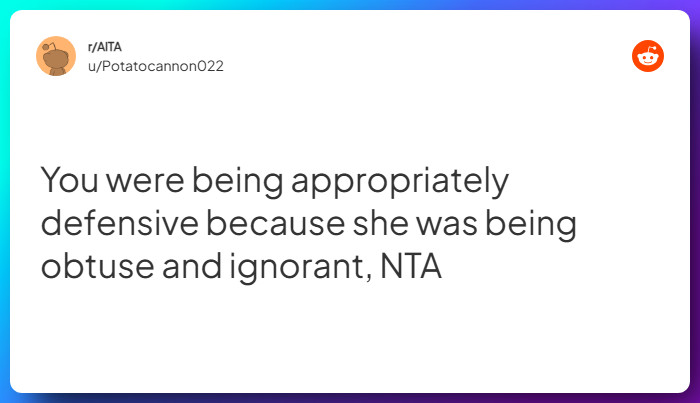
Comment from u/Life_Buy_5059
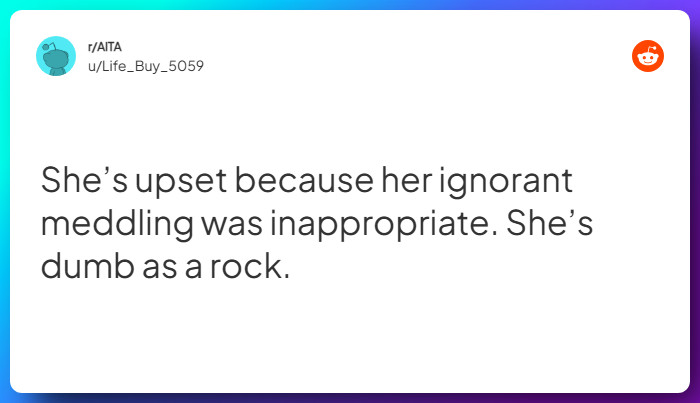
Research emphasizes that misapplying pet care standards to working animals can lead to stress and behavioral issues. Dr. Ramani Durvasula, a clinical psychologist, states, "Understanding the specific needs of working animals is crucial; otherwise, well-meaning interventions can do more harm than good." This highlights the necessity for education on animal welfare to foster empathy and understanding, as noted on her professional website drramani.com.
Comment from u/TheGentleman_J
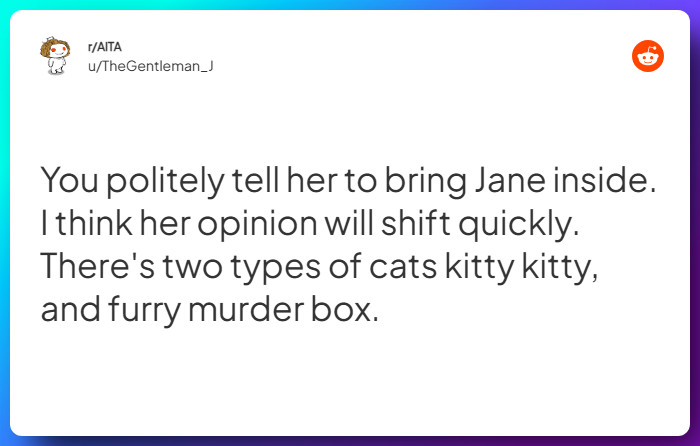
Comment from u/No_Goose_7390
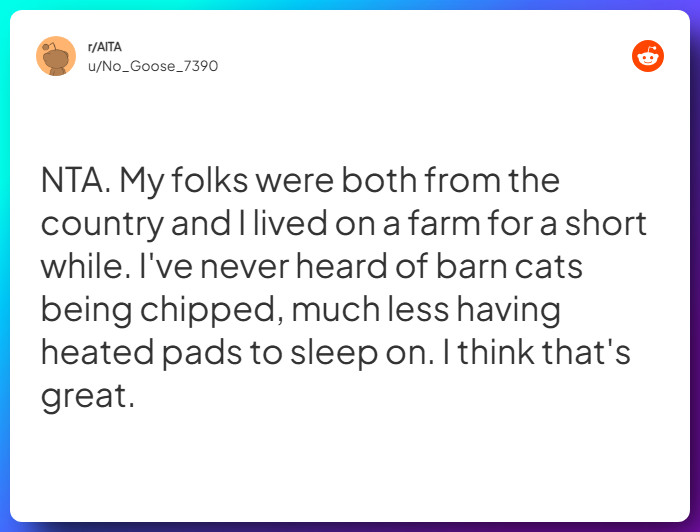
Friendship and Moral Responsibility
Defending the well-being of animals often puts individuals in difficult positions within friendships. Dr. Alan Kazdin notes that moral responsibility can create tension when friends hold differing views on pet care.
His research underscores the importance of maintaining integrity while navigating these complex social dynamics.
Comment from u/Puzzleheaded_Low5945

Comment from u/almondtt
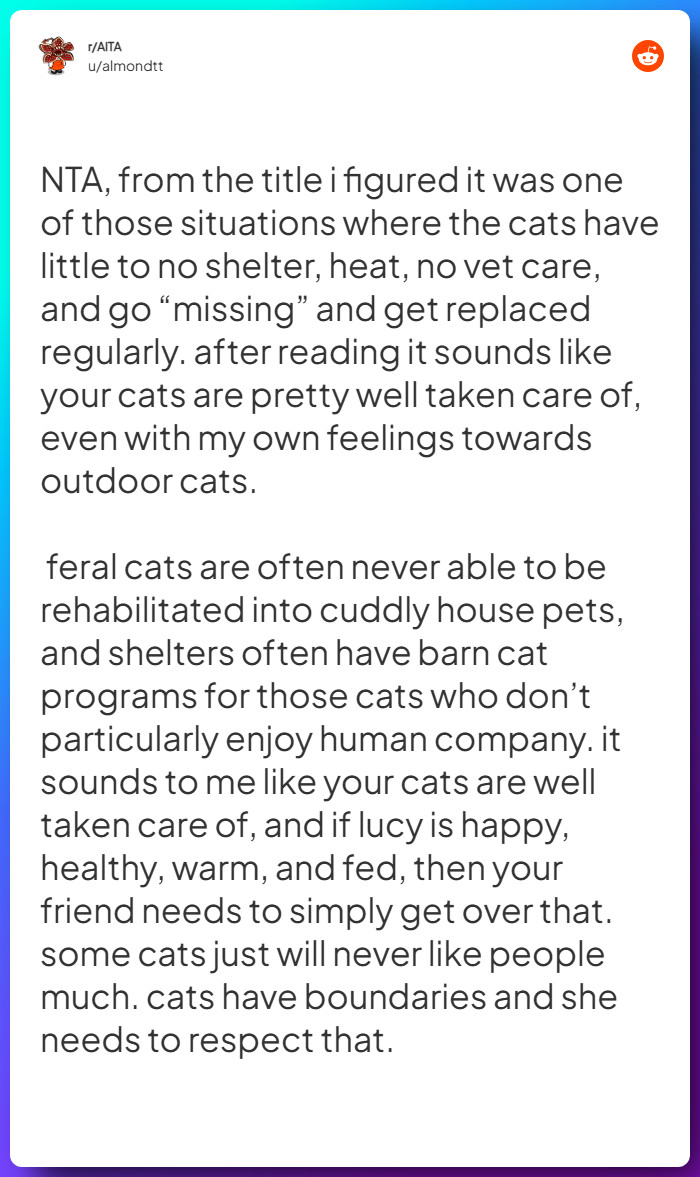
To address disagreements, it’s important to communicate clearly about the rationale behind defending the welfare of working cats. Using non-confrontational language and focusing on shared values can facilitate understanding and reduce conflict.
Engaging in conversations that emphasize empathy for the animals involved can also help shift perspectives and promote more informed discussions.
Comment from u/gmgregor
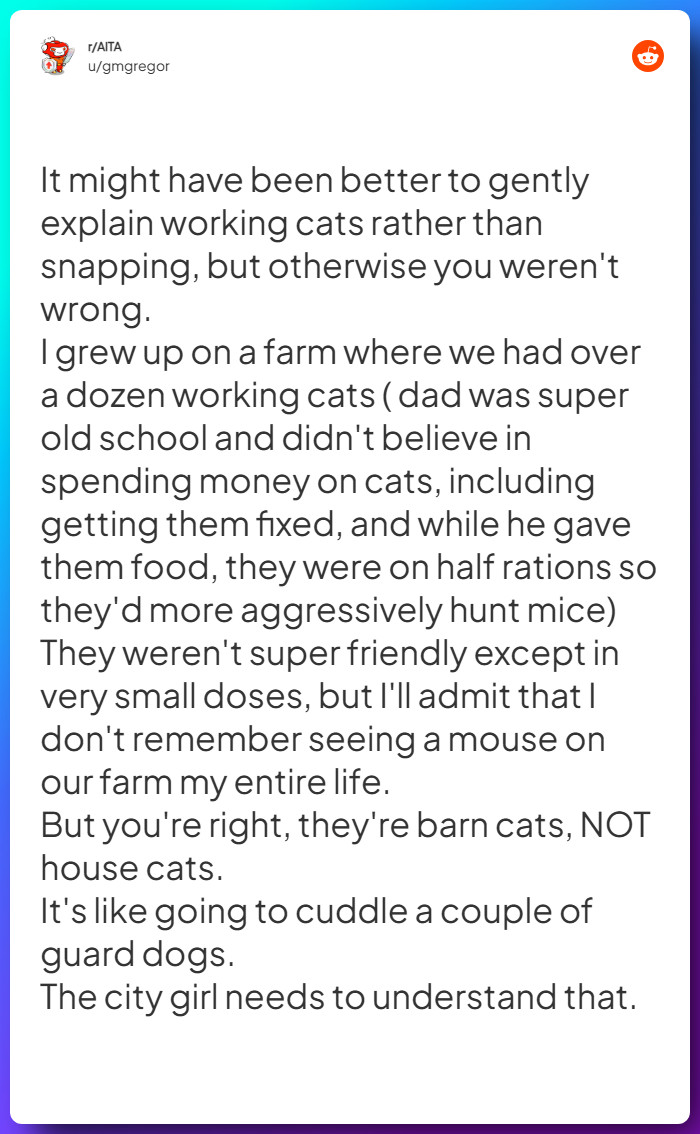
Comment from u/Bellavoce29

Share your thoughts and experiences in the comments section.
Comment from u/Alpacachoppa
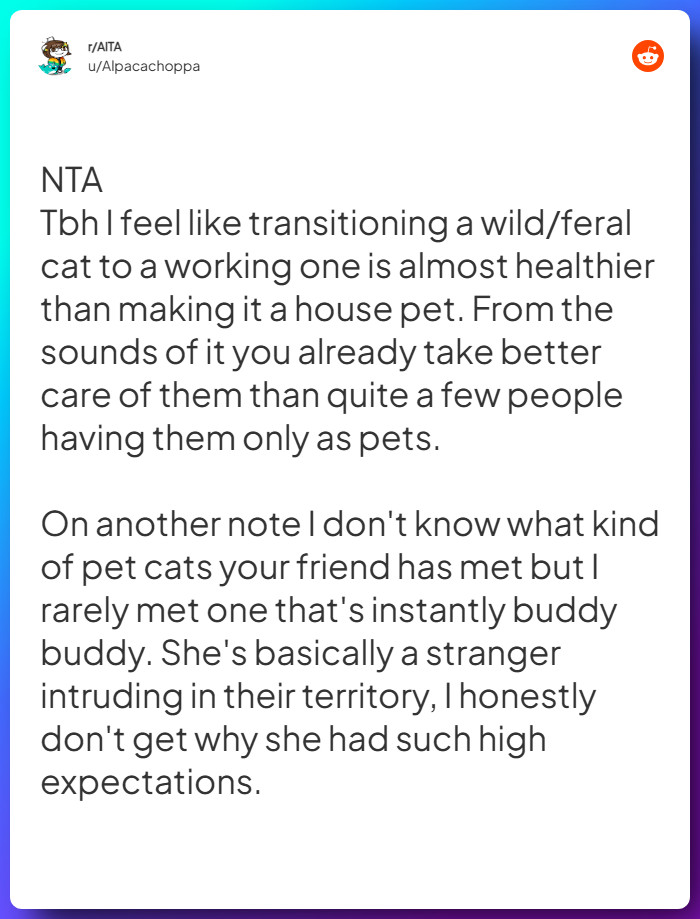
Psychological Analysis
This situation illustrates the challenges of advocating for animal welfare within personal relationships. It's important for individuals to communicate their perspectives thoughtfully and with empathy, recognizing that differing views can lead to tension.
Encouraging open discussions about these issues can help bridge gaps in understanding and promote informed decision-making regarding animal care.
Analysis generated by AI
Analysis & Alternative Approaches
In conclusion, the ethics surrounding animal treatment and welfare require thoughtful consideration and understanding. Research consistently shows that respecting the unique needs of working animals is essential for their well-being.
By fostering open dialogues and educating friends on these issues, individuals can advocate effectively for animal welfare while maintaining healthy relationships.



